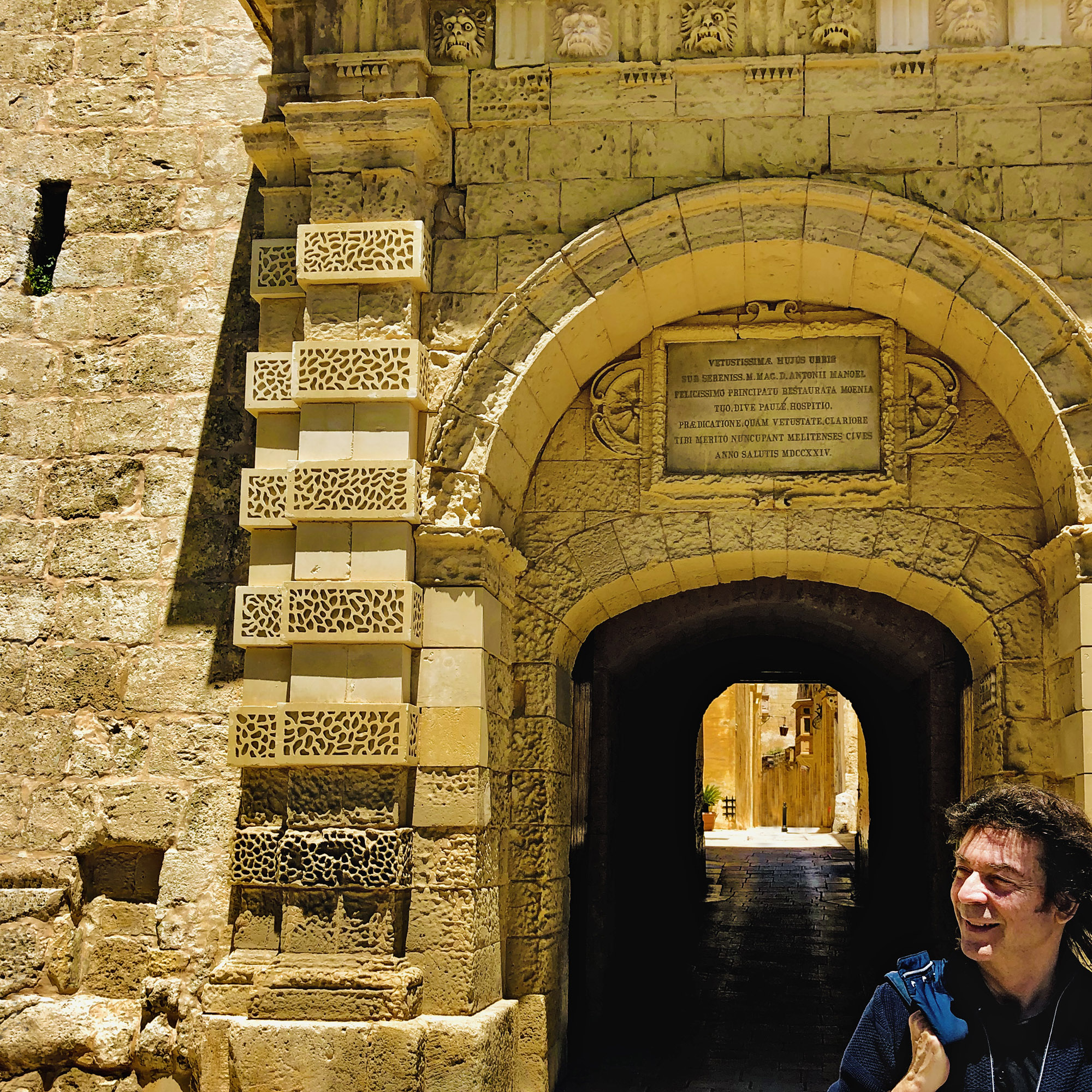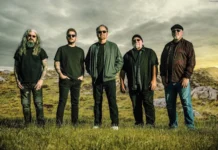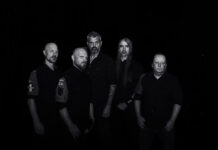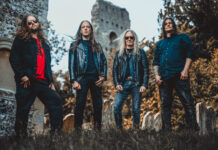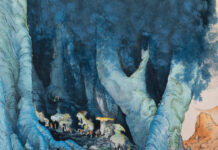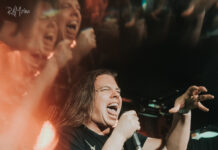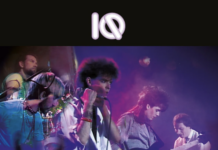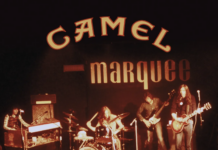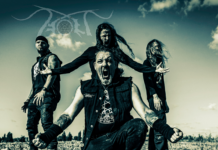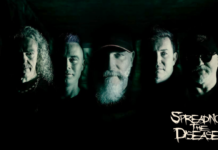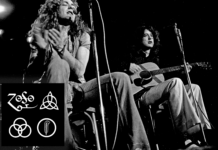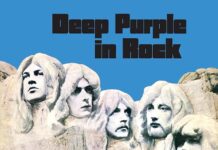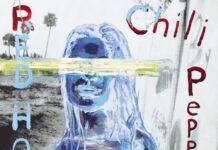Steve Hackett needs no introduction, he’s one of the most respected guitarists in the prog genre, a rock ‘n roll Hall of Famer for his work with Genesis, and he regularly features at or near to the top of polls listing the best guitarists. But his work goes well above and beyond prog rock. He draws his influences from a wide variety of styles, possibly wider than most, and merges them into whatever it is he’s hoping to create. As his 2019 album At The Edge of Light, and current album Under a Mediterranean Sky illustrate, his music is often infused with jazz, blues and even, on recent albums, world music. His solo albums usually feature guitar as the dominant instrument but, as Edge of Light and Mediterranean Sky suggest, not exclusively, with the inclusion of an orchestra and other exotic instruments .. his latest album features musicians performing on the Duduk, Oud and the Tar, with Hackett playing the Charango .. not exactly rock ‘n roll but it works.
Hackett’s approach to his music takes a different route from others. He says .. “I’ve always pitched my tent in the genre that says, ‘the more obscure something is, the more I want to go for it.” As a result, his solo career has certainly been much less commercially successful than his ex-Genesis bandmates, but he’s one hell of a lot more interesting to listen to. His work is always impeccably well-crafted and, while a few of his solo albums may have fallen short, all of them are worth a listen. Whether he’s playing full-on prog or world music, it’s always performed with the touch of a master craftsman.
On his latest album, the wholly instrumental Under a Mediterranean Sky, he takes the listener on what he describes as a “virtual journey to places I’ve enjoyed visiting, a chance to travel with music,” with every track on the album portraying a different place. Hackett plays mainly nylon guitar and is accompanied by orchestral sounds and other instruments on this imaginary journey through the Mediterranean.
So, despite being still in recovery after minor kidney surgery, Steve Hackett agreed to talk to RAMzine about his latest album and his approach to his music, and I began by asking him whether Under a Mediterranean Sky would have been written and recorded had his tour plans for 2020 not been loused up by the pandemic?
Steve Hackett (SH): “ Well, to be honest, last year, we were talking to our record company, Inside Out, about whether to do a rock album or an acoustic album, and they said we’d like to take both. So, earlier this year, we ..the band, my wife Jo and myself ..managed to get, literally, the last flight out of Philadelphia as our US tour had been terminated, America pulled down the shutters and closed up because of Covid, so I thought ‘why not get on with an acoustic album straight away?’ so we did.”
“I had the idea for Under a Mediterranean Sky and we thought, as it was lockdown and people weren’t able to travel, perhaps we could do something which functioned in a more symbolic way and allowed for an inner journey, and if people wanted to dream with it, they could. So I guess you could say the album is a bit of a soundtrack to a dream, depending on the way you like to listen to music, whether you want to try and work out the changes or drift off with a glass of wine. I did the album as a non-competitive thing, a kind of alternative landscape to looking at the four walls we’re all currently surrounded by and hemmed in by.
“At the same time, I’ve also been working on other projects, but this has been the first acoustic and orchestral thing I’ve done for some years, since Tribute in 2009. It’s an alternative to rock ‘n roll, isn’t it ?” He laughed at the thought.

Under a Mediterranean Sky is certainly different from anything Hackett’s done for some years, so I wondered who he had in mind when he made the album; was it his usual fanbase or anyone who enjoys listening to music?
SH: “Well, you know, I just follow my heart with this kind of thing. I love classical guitar and flamenco. I love all kinds of things which aren’t as popular as rock, but,” he paused, “ who knows who picks up on this kind of stuff?
“It’s funny. I did an acoustic album years ago with an orchestra, and I got quite a bit of play on ‘Classic FM,’ and suddenly I was getting people writing to me who normally wouldn’t listen to rock ‘n roll at all, and it was obviously a very different audience, maybe people who’d learned to play piano at home, and they wouldn’t be the leather jacket crowd you’d normally get at gigs. Nothing wrong with leather jackets,” he stated, “I love all of it, music in its entirety, but this was a different audience, using an entirely different kind of language to describe what they thought I’d done with this album, so I was very pleased to welcome in a whole different audience, so you could say it was a sideshow to rock ‘n roll, as all forms of music are. Compared to rock ‘n roll, all other forms of music are marginalised anyway. But I’m happy to do it for the love of it, and if it only sells two copies, to my mum and her sister,” he laughed, “fine. If it goes ballistic, well, that’s also fine.”
Did Steve think Under a Mediterranean Sky would be performed ‘live’ at some future point?
SH: “I have played some of the tracks ‘live’ before but, in the main, I tend to think of this kind of stuff as,” he thought for a moment, “music to drift off to. It’s difficult to find the words to describe it, but if I was going to be pretentious, I’d describe it as ‘Post-industrial pan cultural,” he laughed again,” that’s for the intellectuals and all the rest, and it’ll probably get me into pseuds corner.
“But, on the other hand, I do it for the love of it. You could say this bit is more flamenco or more classical, but really it’s more of an attempt to be virtuosic in places. Rock guitar, even at its most dazzling, most of the time it’s the single line which is being played, no matter how fast or slow you’re playing. This is different. You’re playing parts on the same guitar at the same time which, personally, I find, infinitely more difficult, so you could file it under ‘difficult music’ if you want. I guess the secret is to play something where the listener doesn’t think, well, the fretboard is limited compared to the keyboard, so I think this is the challenge for all guitarists”
Steve Hackett occupies an interesting position in the music spectrum, in that when most fans tend to think of him, he’s immediately regarded as a ‘prog rocker,’ but as his last two studio albums, At The Edge of Light and now Under a Mediterranean Sky suggest, there’s far more to him than just prog. He clearly draws his influences from a diverse range right across the board, particularly world music as heard on these albums, so I wondered what was it about world music which attracted him to incorporate it on his albums?
SH: “You know, that’s a very interesting thing. I never thought I’d ever nail my colours to the mast as far as world music is concerned, but it came as a by-product of travelling and meeting people and hearing them play instruments in places like cafes or street corners, rather than arenas. When I was in Morocco, some years ago, I heard someone playing the Arabian Oud, the fretless Oud, and I thought this guy was absolutely marvellous. Next night I heard someone play and he was even better. So I bought an Oud myself and played it from time to time, probably very badly, but it colours the way you write music, particularly if I’m trying to describe some of the extraordinary landscape I’ve seen, places like Egypt and Jordan. Describing it musically, an Oud steps into this territory, like some of the other instruments from various countries around the world used on this album, like the Tar, the Duduk and the Charango. I’ve met people who can play these instruments wonderfully, and they could be from anywhere. I marvel at the skills of others on these instruments, and it’s nice for me not to always take centre stage.”
Sticking to the musician theme, I wondered whether Steve thought it was more important for him to be considered as a musician, making albums with wide ranges of instruments and influences, like his last two, or as a prog rocker who’s simply the keeper of the Genesis flame, which is now a widespread perception of him?
SH: “Well, for me, I don’t think you have to do one at the expense of the other. I noticed, when we did ‘Selling England by the Pound’ in 1973, John Lennon gave us a name check, saying we were one of the bands he was listening to, so that was possibly my proudest moment. A little later, I heard Lennon arguing with Yehudi Menuhin on TV, and Yehudi had used a piece of mine for a film he was making about English gardens and I thought, these two are arguing but, on the other hand, it was nice to know there was some common ground between them. Quite by chance, maybe Lennon had picked up something I was involved with in Genesis, and Yehudi had picked up something I’d done on my second solo album, which was a piece of my brother playing flute.
“With Genesis, however, I notice over time the guys have got more dismissive of the early period and what the rest of us perceive as their more ‘poppy’ period, when they were infinitely more successful,” he exclaimed. “Nonetheless, I think what we did at that stage, and the record sales we achieved, I don’t think I need to aim higher than that so, for me, what they might dismiss, I choose to celebrate and say, ‘I think this was really great’.”
“It’s very odd. Even now, we talk to each other, me and the Genesis guys, but it’s often privately to congratulate each other, and then find it being publicly denounced. It’s a strange competitive team that doesn’t work together any more, but occasionally reconvenes as a three piece,” he paused for a moment, “but I prefer to think of Genesis as a five piece which existed between 1971 and 1975 with Peter Gabriel, and into this picture I’d like to include my predecessor in Genesis, Anthony Phillips, who I think was the prime motivator and prime writer. He’s very self-effacing but I see quite a bit of him.”
I ventured to suggest to Steve that Selling England by the Pound is, for me, an absolute prog classic and a desert island album.
SH: “That’s the one I think is the best album,” Steve agreed, “and it happened to be made as a five piece. We did a couple as a four piece, and they had lots of strong points, but for me overall ‘Selling England ..’ is the strongest, most surprising non-formula album. I mean, we didn’t know we were supposed to be progressive, we really didn’t, and the subsequent album, ‘Lamb Lies Down,’ on reflection was probably rock meets Rachmaninov, or a Mexican stand-off between Peter Gabriel and Tony Banks, a collision of very different schools.
“But it’s a very pleasant memory that we did that, to the exclusion of songs which were perhaps less virtuosic,” he said, proudly, “ and the musicianship was really starting to shine through at this stage, so I’m proud of the fact it’s got good songs on it, quirky lyrics with social comment and bits of virtuosity, and prog-isms all over it. But I don’t think we were trying to do any one kind of music, I think we were just trying to do separate themes, a film for the ear rather than the eye.”
Steve’s music down the years has embraced a wide variety of styles and influences, and he’s known for more than just playing Genesis. So, how important does he regard it to keep moving forward as a musician?
SH: “ Well, I think I use one as a platform for the other. I mean, I’m infinitely more well known for what I did with Genesis, but occasionally it’s nice to work with an orchestra or work with world musicians, or even get my toes wet dabbling with Jazz or Blues. I grew up wanting to be a blues player. I loved the Blues, and I used to go and see Peter Green playing with John Mayall’s Bluesbreakers every other week. I was hugely influenced by this. I was also lucky enough to see Hendrix ‘live’ a couple of times, and also Eric Clapton, and they were great guitar lessons. I’m currently reading a book about Hendrix, and he was a real one-off, but then so was Segovia,” he emphasised. “My record collection’s quite broad.
“People ask who I listen to now, and do I think there’s a progressive scene ? I listen to Elbow, I like Muse with their pan-genre approach and also Florence & the Machine, with their operatic approach and wide dynamics, and although none of these acts are being described as progressive, in terms of the sheer bulk of records sold, people think of the sub-culture that is progressive versus really successful acts, they might be taking a leaf out of the same book. Muse might wander off into a piece played by Chopin or something inspired by Prince. And why not?” he asked, “why can’t it all be under the same umbrella ? If it’s music without prejudice, who knows, progressive and punk might pull something off together.”
Time was running out so I had one more question. How pleased was he with the reception given to his recent autobiography, There’s a Genesis in my Bed?
SH; “ It’s all gone very well. In fact, we had a call from the publisher today saying we’ve only got three hundred copies left in the warehouse, ‘so I think we should do a paperback version next year.’ First of all, I don’t think he was expecting the book to sell the quantities it has, but it seems to have done very well so it’s possible there could be an updated edition next year, and who knows, the paperback might have a different cover.
“Lockdown throws up all kinds of possibilities, and meanwhile I’m doing rock stuff at the same time. ‘..Med Sky is the current project but I always tend to think in terms of any subsequent projects, of what’s coming next.”
With some solo artists, their passion for music and their desire to embrace new ideas wanes and they get older, but Steve Hackett’s passion for music and exploring new ideas hasn’t. He still marches forward producing quality new music while, at the same time, playing the music which made Genesis such a creative force in the 1970’s for a new generation. It was said, when Peter Gabriel left Genesis in 1975, they lost their brains, but when Steve Hackett left in 1977, they lost their heart and soul, the man who gave them their musical edge. Who am I to disagree with this comment?

